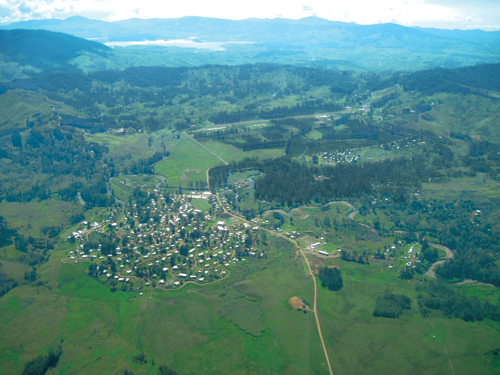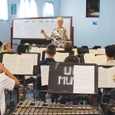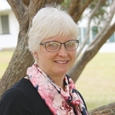
I teach instrumental music at the end of the earth. That is what one visitor said to me when he got off a little Cessna 206 after flying for two hours over heavy jungle terrain. In reality though, even though I am in the Eastern Highlands of Papua New Guinea, I have many modern amenities, including running water (until the drought we are having causes problems in that area) and an indoor toilet. My home is made of plywood and sits on stilts because of earthquakes, but it is home to me.
We are 5,000 feet above sea level, so even though it is the tropics the temperature has fallen to 54 degrees in my bedroom at night. There is no insulation and I have louvered windows that add a little breeze through their leaky openings. When I have come back to the States on furlough, people have generously given me things to decorate my home. I obviously love it as I have been here for over 35 years. We have one little store that provides food and staples and other stores in the larger towns around PNG, but it takes traveling by vehicles (which I don’t own) and in some cases, can raise concerns about getting robbed. A fresh produce market operates three mornings a week, and people come in from miles around to sell their produce. Because of the drought, fewer people come to sell because their gardens are drying up. This is true for the entire country right now.
My school, Ukarumpa International School, (UIS) has about 250 children in K-12. At times I have had thirteen different nationalities represented in my band. Our students consist of missionary kids, Papua New Guinea nationals, and commercial students whose parents work in the area. Teachers come from around the world to teach here, but not for the money. Each family or single person raises their own support through an organization called Wycliffe Bible Translators. I have four supporting churches and many individual supporters who faithfully send money in each month to WBT. Sometimes people I don’t know send in money to help meet some need that I might have. It’s called living on faith.
In 2002, our music building was a classroom with the lowest ceiling of all the classes on campus. You know what that can do to a director’s hearing. Not only that, it had been built in the late 1970s and the beams were now rotted out, there were cracks in the cement floor bringing with it dust and dirt, and black mildew had overridden the place. (The humidity and rainy season in the tropics can cause huge damage.) From working in this environment, my asthma turned into life-threatening pneumonia. I ended up in a hospital in Cairns, Australia and spent two months recovering enough to travel back to Grand Rapids, my home in the United States.
When I returned, the school administration had tried to clean the music building up as much as possible but determined that a new building was needed. A new building was not in the school budget, so I started raising $135,000 for it. It took a few years, but finally we moved into a building that was taller than our last building and big enough to set up the band on one side and the choir on the other. It has been wonderful to work in a clean environment, and I even have an air conditioner in my private lesson room. This helps keep things clean when people in the valley are burning off the sides of the mountains to make their gardens. The smoke can be overwhelming.
We order music and instruments from the States with much of it shipped by boats that can take months to arrive. We have to plan ahead. The blessing we have is that we do have expensive internet, so I can listen to pieces and decide what I really want to buy for my students. We have a large library as we have collected many pieces over the years. Some have only been used for sightreading because back before the computers, we ordered sight unseen or by word of mouth. If we didn’t like it, we used it for sightreading.
Over the years, I was often the only instrumental band person here. I taught every level from 5th grade beginners to high school students. I also started a jazz band. The energy of being young helped me overcome many difficulties. I had to make all my meals from scratch, including homemade bread. I didn’t have an automatic washer that I could walk away from and come back later when it had run its cycle. Life in the good old days was fun, even with all the extra work. Back in the early 1980s we had one television and VCR and two videos (Roots and Against the Wind). We singles played a lot of games on weekends or took motorbike rides down to the river to swim. Kids learned to play games using their imagination because there were no electronics. As the world moved on with electronics, we stood in place using snail mail. It took 4-6 weeks to get a letter, then another 4-6 weeks before they would receive a reply. Phone calls were only in case of an emergency because it was extremely expensive to call out.
My professional development over the years has included getting instrument repair help from a gentleman who started the instrument repair school in Redwing, Minnesota. He spent two weeks with me teaching the basics of instrument repairs so I would be able to do them when I got back to PNG. There was no music shop to bring broken springs or bad pads at the time.
Over the years, more people came to work in PNG and I have had four people who have proven their worth in more ways than one in helping teach our students here in the UIS Music Department. I have shared what I know in instrument repair, but is also a big help now.
Attending the Midwest Clinic has been incredibly beneficial to me when I am in the States on furlough. It not only gives me new ideas and reinforces what I am already doing. Sometimes when you are alone in the middle of nowhere, it is easy to wonder if you are doing the right thing with your students. As the only school in the country with a band, we have no competition. When I go to a conference, I love hearing other bands performing a piece that I have done with my group. I cannot help but compare these performances to what my group has done
Over the years we have had students performing with well-known symphonies or orchestras in the United States and Europe. I had a student come back to visit who is now a band director in Texas. Sometimes I have heard the comment, “What good can come out of Ukarumpa, Papua New Guinea?” We have great kids, and it is a great place to teach. Great things can come out of Ukarumpa.
This past year I have been going down to the capital city, Port Moresby, one weekend a month to train teachers and help teach young Papua New Guinean children who have never seen a Western instrumental band This is a new challenge for me, and I am grateful for the people who donated instruments and music books for this group.
I plan to return to the United States in 2020 to put roots down in my home country. Papua New Guinea will have been my home for 40 years by then. I hope to settle in Grand Rapids, give some lessons, and visit some local bands. I can’t imagine my life without music and kids.






